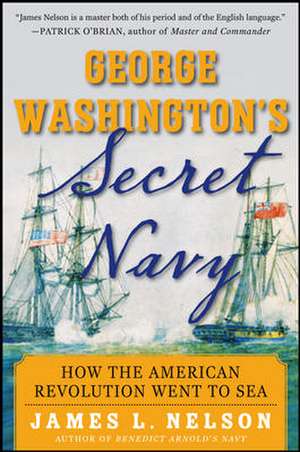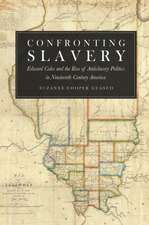George Washington's Secret Navy: How the American Revolution Went to Sea
Autor James L. Nelsonen Limba Engleză Hardback – 30 apr 2008
In 1775 General George Washington secretly armed a handful of small ships and sent them to sea against the world's mightiest navy.
From the author of the critically acclaimed "Benedict Arnold's Navy," here is the story of how America's first commander-in-chief--whose previous military experience had been entirely on land--nursed the fledgling American Revolution through a season of stalemate by sending troops to sea. Mining previously overlooked sources, James L. Nelson's swiftly moving narrative shows that George Washington deliberately withheld knowledge of his tiny navy from the Continental Congress for more than two critical months, and that he did so precisely because he knew Congress would not approve.
Mr. Nelson has taken an episode that occupies no more than a few paragraphs in other histories of the Revolution and, with convincing research and vivid narrative style, turned it into an important, marvelously readable book."
--Thomas Fleming, author of "The Perils of Peace: America's Struggle to Survive after Yorktown"
"A gripping and fascinating book about the daring and heroic mariners who helped George Washington change the course of history and create a nation. Nelson wonderfully brings to life a largely forgotten but critically important piece of America's past."
--Eric Jay Dolin, author of "Leviathan: The History of Whaling in America"
"The political machinations are as exciting as the blood-stirring ship actions in this meticulously researched story of the shadowy beginnings of American might on the seas."
--John Druett, author of "Island of the Lost: Shipwrecked at the Edge of the World"
Preț: 280.08 lei
Nou
53.61€ • 55.75$ • 44.92£
Carte disponibilă
Livrare economică 21 februarie-07 martie
Specificații
ISBN-10: 0071493891
Pagini: 378
Dimensiuni: 163 x 236 x 31 mm
Greutate: 0.71 kg
Ediția:Direct.
Editura: McGraw-Hill Companies
Notă biografică
Textul de pe ultima copertă
"James Nelson is not the first historian to reveal this little-known albeit incredibly important aspect of our Revolution, but no one has done it more thoroughly or with greater literary grace."
--William M. Fowler, author of Empires at War
In July 1775, in his first inspection of the American encampment on the outskirts of Boston, the Continental Army's newly arrived commander-in-chief noted its haphazard design and shabby construction--clearly the work of men unprepared to face the world's most powerful fighting force. George Washington had inherited not only an army of woefully untrained and ill-equipped soldiers, but a daunting military prospect as well. To the east he could see the enemy's heavily fortified positions on Bunker Hill and a formidable naval presence on the river beyond. British-occupied Boston was defended by impressive redoubts that would easily repel any American assault, and Boston Harbor bristled with the masts of merchant ships delivering food, clothing, arms, ammunition, and other necessities to the British. Washington knew that the king's troops had all the arms and gunpowder they could want, whereas his own army lacked enough powder for even one hour of major combat. The Americans were in danger of losing a war before it had truly begun.
Despite his complete lack of naval experience, Washington recognized that harassing British merchant ships was his only means of carrying the fight to the enemy and sustaining an otherwise unsustainable stalemate. But he also knew that many in Congress still hoped for reconciliation with England, and in that climate Congressional approval for naval action was out of the question. So, without notifying Congress and with no real authority to do so, the general began arming small merchant schooners and sending them to sea to hunt down British transports "in the Service of the ministerial Army."
In George Washington's Secret Navy, award-winning author James L. Nelson tells the fascinating tale of how America's first commander-in-chief launched America's first navy. Nelson introduces us to another side of a general known for his unprecedented respect for civilian authority. Here we meet a man whose singular act of independence helped keep the Revolution alive in 1775.













